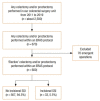High Compliance With Surgical Site Infection (SSI) Prevention Bundle Reduces Incisional SSI After Colorectal Surgery
- PMID: 32674555
- PMCID: PMC8273712
- DOI: 10.3393/ac.2020.04.10.2
High Compliance With Surgical Site Infection (SSI) Prevention Bundle Reduces Incisional SSI After Colorectal Surgery
Abstract
Purpose: This study aimed to evaluate association between compliance with surgical site infection (SSI) prevention bundle and the development of superficial or deep incisional SSI following colorectal surgery and to evaluate the impact of incisional SSI on surgical outcomes.
Methods: A prospectively collected database of consecutive patients undergoing elective colectomy and/or proctectomy from 2011 to 2019 in a university hospital was reviewed. The association between compliance with Thailand's SSI Prevention Bundle (10 level-1A interventions) and the incidence of incisional SSI was determined. Surgical outcomes were compared between those with incisional SSI and those without.
Results: This study included 600 patients with a median age of 64 years (range, 18-102 years). Some 126 patients (21.0%) had stoma formation and 52 (8.7%) underwent laparoscopy. The incidence of incisional SSI was 5.5% (n = 33; 32 superficial incisional SSI and 1 deep incisional SSI). Higher compliance with care bundle tended to decrease incisional SSI (P = 0.20). In multivariate analysis, compliance of 70% or more was the only dependent factor for reducing incisional SSI (odds ratio, 0.39; 95% confidence interval, 0.15 to 0.99; P = 0.047). None of individual interventions were significantly associated with a lower probability of incisional SSI. Compared with counterparts, patients with incisional SSI had a 2-day longer length of postoperative stay (6 day vs. 4 day, P < 0.001) but comparable time for gastrointestinal recovery and similar rate of 30-day mortality or readmission.
Conclusion: High compliance with SSI prevention bundle (especially ≥ 70%) reduced incisional SSI after colorectal surgery.
Keywords: Colon; Compliance; Rectum; Surgery; Surgical wound infection.
Conflict of interest statement
No potential conflict of interest relevant to this article was reported.
Figures



Similar articles
-
The preventive surgical site infection bundle in patients with colorectal perforation.BMC Surg. 2015 Dec 18;15:128. doi: 10.1186/s12893-015-0115-0. BMC Surg. 2015. PMID: 26680600 Free PMC article.
-
Wound infection after elective colorectal resection.Ann Surg. 2004 May;239(5):599-605; discussion 605-7. doi: 10.1097/01.sla.0000124292.21605.99. Ann Surg. 2004. PMID: 15082963 Free PMC article.
-
Risk factors for incisional surgical site infection after elective laparoscopic colorectal surgery.Ann Gastroenterol Surg. 2019 Jan 11;3(2):202-208. doi: 10.1002/ags3.12229. eCollection 2019 Mar. Ann Gastroenterol Surg. 2019. PMID: 30923790 Free PMC article.
-
Standardized perioperative care reduces colorectal surgical site infection in children: A Western Pediatric Surgery Research Consortium multicenter analysis.J Pediatr Surg. 2023 Jan;58(1):45-51. doi: 10.1016/j.jpedsurg.2022.09.026. Epub 2022 Sep 26. J Pediatr Surg. 2023. PMID: 36289033
-
Prophylactic negative pressure wound therapy in colorectal surgery. Effects on surgical site events: current status and call to action.Updates Surg. 2015 Sep;67(3):235-45. doi: 10.1007/s13304-015-0298-z. Epub 2015 Apr 29. Updates Surg. 2015. PMID: 25921360 Review.
Cited by
-
The Latest Results and Future Directions of Research for Enhanced Recovery after Surgery in the Field of Colorectal Surgery.Ewha Med J. 2023 Dec;46(Suppl 1):e23. doi: 10.12771/emj.2023.e23. Epub 2023 Dec 31. Ewha Med J. 2023. PMID: 40703216 Free PMC article. Review.
-
Clinical practice guidelines for enhanced recovery after colon and rectal surgery from the American Society of Colon and Rectal Surgeons and the Society of American Gastrointestinal and Endoscopic Surgeons.Surg Endosc. 2023 Jan;37(1):5-30. doi: 10.1007/s00464-022-09758-x. Epub 2022 Dec 14. Surg Endosc. 2023. PMID: 36515747 Free PMC article.
-
Effect of a colorectal bundle in an entire healthcare region in Switzerland: results from a prospective cohort study (EvaCol study).Int J Surg. 2024 Dec 1;110(12):7763-7774. doi: 10.1097/JS9.0000000000002123. Int J Surg. 2024. PMID: 39453984 Free PMC article.
-
Strategies to Reduce Post-Hemorrhoidectomy Pain: A Systematic Review.Medicina (Kaunas). 2022 Mar 12;58(3):418. doi: 10.3390/medicina58030418. Medicina (Kaunas). 2022. PMID: 35334594 Free PMC article.
-
Effect of Standardized Bundle Care and Bundle Compliance on Reducing Surgical Site Infections: A Pragmatic Retrospective Cohort Study.Med Sci Monit. 2024 Mar 25;30:e943493. doi: 10.12659/MSM.943493. Med Sci Monit. 2024. PMID: 38523334 Free PMC article.
References
-
- Cassini A, Plachouras D, Eckmanns T, Abu Sin M, Blank HP, Ducomble T, et al. Burden of six healthcare-associated infections on European population health: estimating incidence-based disability-adjusted life years through a population prevalence-based modelling study. PLoS Med. 2016;13:e1002150. - PMC - PubMed
-
- Romy S, Eisenring MC, Bettschart V, Petignat C, Francioli P, Troillet N. Laparoscope use and surgical site infections in digestive surgery. Ann Surg. 2008;247:627–32. - PubMed
-
- Lohsiriwat V, Lohsiriwat D. Antibiotic prophylaxis and incisional surgical site infection following colorectal cancer surgery: an analysis of 330 cases. J Med Assoc Thai. 2009;92:12–6. - PubMed
-
- Lohsiriwat V, Lohsiriwat D, Boonnuch W, Chinswangwatanakul V, Akaraviputh T, Riansuwan W, et al. Outcomes of sphincter-saving operation for rectal cancer without protective stoma and pelvic drain, and risk factors for anastomotic leakage. Dig Surg. 2008;25:191–7. - PubMed
-
- Allegranzi B, Bischoff P, de Jonge S, Kubilay NZ, Zayed B, Gomes SM, et al. New WHO recommendations on preoperative measures for surgical site infection prevention: an evidence-based global perspective. Lancet Infect Dis. 2016;16:e276–87. - PubMed
LinkOut - more resources
Full Text Sources
Medical

